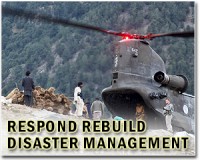| . |  |
. |
Islamabad (AFP) Nov 3, 2010 The United Nations on Wednesday expressed increasing alarm over sluggish funds for Pakistan's 21 million flood victims, appealing to donors to act swiftly to stave off a new winter emergency. "We are getting more concerned that the funding is slowing down," UN spokeswoman Stacey Winston told a press conference in Islamabad. Only 39 percent of a record appeal for nearly two billion dollars -- about 760 million dollars -- has been received and almost another eight million pledged, UN statistics show. Unprecedented monsoon rains triggered catastrophic flooding across Pakistan in July and August, ravaging an area roughly the size of England and affecting 21 million people in the poverty-stricken country's worst natural disaster. The World Bank and Asian Development Bank estimate the damage at 9.7 billion dollars and the Red Cross warned this week that millions of Pakistanis affected by the calamity will need humanitarian assistance for the next two years. Winston said large tracts of land were still under water in Sindh province in southern Pakistan and warned the emergency was far from over. "We are very grateful for everybody's generosity but it is simply not enough," she said. Winston said latest imagery from certain areas of Sindh showed 20-kilometre (12-mile) stretches of land still under water. She said the displaced were unable to return to homes inundated by waters three or even six feet deep that could linger for at least three months. "It is still a serious emergency and that is what we have to convey to the world -- that Pakistan cannot be forgotten, that people are still very much suffering. "We need the funds and the support and resources to reach people in need so that they can go home and they can rebuild their lives." Winston said the onset of winter threatened a new crisis. "We are looking at another emergency in the north with winter coming. We do not want the people to be left out in the cold. We want to provide them with the housing and with the materials they need to rebuild their homes." Fresh data from the government showed that the number of damaged houses had risen to more than 1.7 million in Sindh and the northwestern province of Khyber-Pakhtunkhwa, she said. Eliane Engeler, spokeswoman for the International Organisation for Migration, said only 15 percent of those displaced in Sindh had been given shelter material. UN refugee agency official Duniya Aslam Khan said around one million people were living in camps in Sindh, where 18 new facilities had been set up for those who had been staying at schools until the new term began.
earlier related report More than 105,000 people have lost their homes and 680,000 people across nearly three quarters of the country have been affected so far, the UN Office for the Coordination of Humanitarian Affairs said in a statement. The numbers are expected to rise with more rains predicted this month, it added. "Like much of the region, Benin was experiencing a nutrition and food security crisis before the floods hit," said Valerie Amos, United Nations Under-Secretary-General for Humanitarian Affairs. "The loss of homes, livestock, clothing, agricultural tools and seeds will have devastating and long-lasting effects for many people." The UN appeal is aimed at providing 250,000 people with food and help with farming, while 680,000 people are targeted for health care and clean water supplies. Seasonal heavy rains have been hitting West Africa for several months but many countries including Benin have experienced much heavier rainfall than usual. The country is also grappling with a cholera outbreak that has killed at least seven people and infected 800, according to the OCHA.
Share This Article With Planet Earth
Related Links Bringing Order To A World Of Disasters A world of storm and tempest When the Earth Quakes
 Are public service announcements effective
Are public service announcements effectiveWashington (UPI) Nov 2, 2010 By now, you've probably heard that taking illicit drugs might have the unfortunate effect of frying your brain - especially if you're familiar with the now-cliche 1980s anti-drug ad that elegantly compares drug use to egg frying with the pithy message: "This is your brain (an egg). This is drugs (a hot frying pan). This is your brain on drugs (one fried egg). Any questions?" Act ... read more |
|
| The content herein, unless otherwise known to be public domain, are Copyright 1995-2010 - SpaceDaily. AFP and UPI Wire Stories are copyright Agence France-Presse and United Press International. ESA Portal Reports are copyright European Space Agency. All NASA sourced material is public domain. Additional copyrights may apply in whole or part to other bona fide parties. Advertising does not imply endorsement,agreement or approval of any opinions, statements or information provided by SpaceDaily on any Web page published or hosted by SpaceDaily. Privacy Statement |